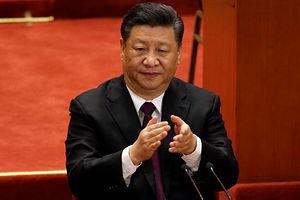From December 25 to 26, the Political Bureau of the Chinese Communist Party Central Committee — a group of 25 members of China’s top leadership — held a “democratic life meeting” in Beijing. In the meeting, Chinese President Xi Jinping said that upholding socialism in the new era is “a great social revolution.”
According to the CCP’s official definition, published in January 2017, a “democratic life meeting” is a “fundamental form of political life within the Party.” It’s an important tool to “strengthen intra-party democracy and supervision and solve conflicts and problems by Party cadres alone.” It’s a “magic weapon” to guarantee the Party’s unity and purity. In the form of “criticism and self-criticism,” each attendant of a “democratic life meeting” is supposed to write down their own problems and criticize themselves publicly so as to “achieve union and solidarity.” In theory, attendants are also free to criticize their superiors and peers in a “democratic” way.
The CCP’s tradition of “criticism and self-criticism” can be traced back to the Yan’an Rectification Movement — an ideological mass movement initiated by Mao Zedong in the early 1940s. Through the Yan’an Rectification Movement, Mao consolidated his power within the CCP.
After Mao’s death, the CCP still held the “democratic life meeting” periodically. One significant “democratic life meeting” was held in 1987. In this meeting, Hu Yaobang, former top leader of the CCP, was ousted from power under criticism on his reform program. But over the next few decades, such meetings seldom took place.
It was not until Xi Jinping came into office in 2012 that the meetings were revived.
In 2015, the Political Bureau of the CCP Central Committee held a two-day “democratic life meeting” in late December over which Xi himself presided. Since, such meetings have become routine again.
Rather than promoting “intra-party democracy,” the “democratic life meeting” led by Xi seemed to function as a way for him to tighten his control over the CCP Central Committee. The 2017 “democratic life meeting,” for example, highlighted “Xi’s core status,” as China’s state news agency Xinhua put it in its English version.
Regarding the latest “democratic life meeting,” Xinhua didn’t even bother to change its wording, still claiming that the meeting “underlines core status of Xi.”
However, what Xinhua’s English version omitted was Xi’s unusually strong remarks.
According to Xinhua’s Chinese version, Xi presided over the latest “democratic life meeting” and delivered a speech in which he emphasized that “upholding and developing socialism with Chinese characteristics in the new era is a great social revolution.”
“[The revolution] demands us to carry out a great struggle with many new historical characteristics,” he added.
Notably, the term “struggle” appeared eight times in Xi’s speech. Xi repeatedly urged the cadres to improve their “ability of struggle,” cultivate their “spirit of struggle,” and “firmly grasp the initiative of struggle.” He even said that cadres should be assigned to “the front line of major struggles.”
However, Xi neither elaborated on the concept of the “great social revolution” nor clarified what those “ major struggles” exactly are, according to Xinhua.
It’s worth mentioning that it’s not the first time Xi used such alarming terms in recent weeks.
On December 18, Xi attended a conference celebrating the 40th anniversary of China’s reform and opening up. During the conference, Xi told the 3,000 officials and foreign guests at the Great Hall of the People that “we will face all kinds of risks and challenges in the future and we may even encounter unimaginable terrifying tidal waves and horrifying storms.”
Xi’s remarks, including “unimaginable terrifying tidal waves and horrifying storms,” “great social revolution,” and “major struggles,” imply an increasingly uncertain future for China.

































